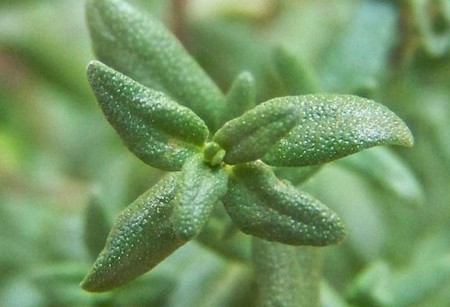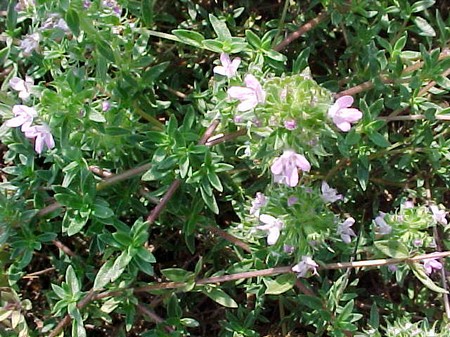Herbal remedy
Thyme is most famous as a powerful antiseptic for both internal and external use. It enhances the immune system’s fight against bacterial, viral and fungal infections. The main component of its volatile oil, thymol, has long been used in antiseptic cream, lotion, mouthwash and toothpaste. Thyme tea or tincture remedies infections of the respiratory, digestive and genito-urinary system – such as colds, coughs, flu, gastro-enteritis, Candida, cystitis and salpingitis (infection of the fallopian tubes).
Thyme makes an excellent remedy, especially for children, for coughs whether they are caused by nerves and anxiety or an infection such as bronchitis, pneumonia or pleurisy. Its relaxant effect on the bronchial tubes relieves asthma and whooping cough, while its expectorant action increases the production of fluid mucus and helps shift phlegm — particularly useful for dry, hacking coughs. By virtue of its sudorific properties, thyme also helps to increase perspiration and bring down fevers.
The relaxing benefits of thyme can also be seen in the digestive system, used to good effect for wind and colic, irritable bowel syndrome and spastic colon. The astringent tannins help to protect the gut from irritation and reduce diarrhoea, while the antiseptic oils fight infections such as gastro-enteritis and dysentery and help re-establish a normal bacterial population in the bowel. This is a great help to those taking antibiotics and those suffering with Candida.
A teaspoonful of tincture half an hour before breakfast has been used traditionally with castor oil for worms. In France, thyme is used particularly as a cleansing liver tonic, stimulating the digestive system and liver function to treat indigestion, poor appetite, anaemia, liver and gall-bladder complaints, skin complaints and lethargy.
Recent research suggests that the volatile oils in thyme may play a vital role in the function of polyunsaturated fatty acids, keeping the body’s cells healthy and slowing the ageing process. PUFAs build cell walls and are vital to the structure of the brain, nervous system and blood vessels. They protect against degenerative problems, heart and arterial problems, skin disease, senile dementia and cancer. The antioxidant effect of thyme oil protects the PUFAs from decay caused by oxygen, and prevents the release of free radicals – molecules that damage cells and tissues leaving behind destructive waste products in the process.
Externally, thyme oil can be used in liniments and lotions for relieving arthritis, muscular pain and itching. It disinfects cuts and grazes, wounds, sores and ulcers. An infusion or tincture of thyme makes a good gargle for sore throats, an antiseptic mouthwash and a douche for thrush and other vaginal infections. It can also be used daily for friction of the hair and as a hair lotion, giving it a healthy lustre and arresting hair fall. Thyme makes an excellent inhalant for chesty conditions, asthma, colds, catarrh and sinusitis. Vinegar of thyme is an old folk remedy used like smelling salts for nervous headaches.
Aromatherapy oil
Thyme produces several oils depending on the soil, climate and altitude in which it grows. The chemo-type that contains a high level of carvarol is a powerful antiseptic, while linalol, geraniol and thujanol chemotypes have much gentler properties and are preferable for home use. Thyme linalol is the only one that is suitable for children.
The use of thyme oil in aromatherapy is very similar to that in herbal medicine. It acts as a stimulant to the circulation, warming the body and warding off illness that results from chill such as sore throats, flu, head colds and coughs. It is also stimulating to both mental and physical energy, as the ancients said. It is excellent as a tonic in debility, for depression, lethargy, when feeling nervously run down, anxious or under stress as when studying for exams. It energizes the digestion, acting as an aperitif and digestive and calming colic and wind. In the chest thvme oil relaxes the bronchial tubes, helpful in asthma, and acts as an expectorant. Inhalations of thyme can be used for coughs, chest infections, whooping cough, emphysema and TB.
Also very helpful are thyme’s powerful antiseptic properties and its ability to stimulate white blood cell production, helping the body’s fight against infection. It brings down fevers, and acts as a decongestant for catarrh, colds, sinusitis and rhinitis. It acts as a diuretic and an emmenagogue and for this reason is contra-indicated in pregnancy. It is used in some parts of the world for intestinal parasites.
Homeopathic remedy: Thymus
Both thymol, the main component of the essential oil, and the tincture of wild thyme, Thymus serpyllum, are homeopathic remedies. Thymol is specific for hookworms, and for genito-urinary problems. It is prescribed for sexual debility, prostate problems, priapism and nocturnal emission. The symptom picture includes low energy, unrefreshing sleep and lascivious dreams, profuse urination with burning and dribbling indicative of prostate problems, aching in the lower back and irritability. The patient wants his own way and craves the company of others.
Thymus serpyllum is used for respiratory infections particularly in children, for asthma associated with tension, for dry nervous coughs, whooping cough and sore throats. It is also prescribed for ringing in the ears, with a feeling of pressure in the head.
The flower essence
The use of thyme as a flower remedy is related to the passage of time, and its acceleration. When dabbed on to a wound or cut, or over an area of trauma or disease in the body, thyme is said to speed healing. It has an amplifying effect, increasing strength and courage, and enhancing the body’s metabolic processes. It imparts greater physical stamina, making it particularly useful in the elderly. When used in combination with other flower essences, rhyme acts to amplify their effects. Thyme the herb has been used since the days of the Ancient Greeks to increase energy and longevity. The flower essence similarly increases energy, enhances concentration and the ability to adapt to seasonal change and the passage of time. It is good for people struggling with time, stressed by deadlines, always trying to beat the clock; or for in old age, helping to protect mind and body from the effects of ageing.

